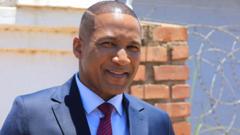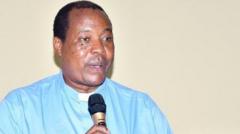In an unprecedented move, Botswana's President Duma Boko is advocating for the legalization of undocumented Zimbabwean migrants by offering them temporary permits, highlighting their contributions to the labor market while aiming to enhance the skills of the local workforce and improve the national economy.
Botswana President Proposes Legalization of Undocumented Zimbabweans to Boost Economy

Botswana President Proposes Legalization of Undocumented Zimbabweans to Boost Economy
Duma Boko, the newly elected president of Botswana, plans to grant temporary work and residence permits to undocumented Zimbabweans, addressing labor shortages and promoting skills transfer.
Botswana's newly elected president, Duma Boko, has announced an ambitious plan to legalize undocumented Zimbabweans residing in the country by providing them with temporary work and residence permits. This initiative comes as Botswana grapples with significant unemployment and seeks to harness the skills of its Zimbabwean migrant population, which has significantly increased due to economic instability in Zimbabwe over the past two decades.
In a recent interview with BBC Africa Daily, Boko, who assumed office last week after leading his party to victory and ending a 58-year reign of the previous ruling party, emphasized the necessity of this decision. "They do jobs that would otherwise not get done," he stated, acknowledging the essential role Zimbabweans play in sectors often avoided by local workers, such as domestic work and farming.
Botswana has become home to one of the largest communities of Zimbabweans fleeing dire economic conditions in their country. While many Batswana have shown resentment towards irregular migrants, Boko highlights that formalizing their status could enhance social cohesion, reduce crime, and alleviate pressure on public resources. With the majority of irregular migrants in Botswana being Zimbabwean, the president noted, “We need to formalise… a proper arrangement that recognizes that people from Zimbabwe are already here.”
However, the proposal has sparked mixed reactions, as there is existing apprehension about increased immigration. Last year's suggestion to utilize identity cards instead of passports for cross-border travel led to public backlash over fears that it would invite more migrants. Boko's current strategy aims to alleviate concerns by emphasizing a structured immigration process that also fosters skills transfer between Zimbabweans and locals. He remarked, “We can’t stop people with skills from coming in when we don't have the skills ourselves."
In tandem with integrating Zimbabweans into the workforce, Boko is focusing on revitalizing Botswana’s economy, particularly through an improved diamond mining agreement with De Beers. With nearly 30% unemployment in a nation of 2.4 million, the president aims to create 100,000 jobs annually over the next five years. His administration's emphasis on entrepreneurship among the youth is evident, as Boko urges the government to facilitate access to affordable finance and markets.
As the nation prepares for his official inauguration at the national stadium in Gaborone, Boko's policies could represent a turning point in Botswana's approach to migration and economic recovery, with potential implications for social dynamics within the region. This move not only seeks to provide dignity and legality to those who have settled in Botswana but also aims to bridge the skills gap urgently needed for the country’s economic prosperity.





















